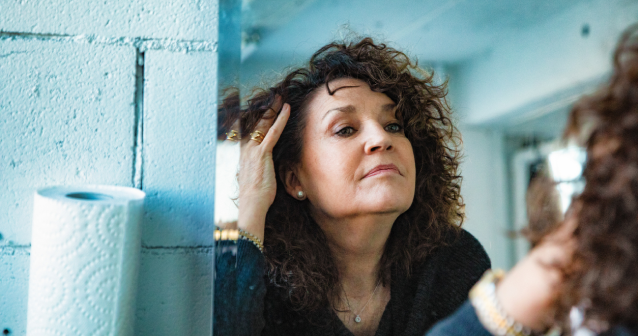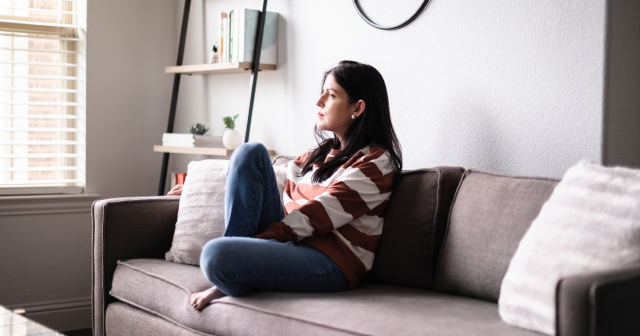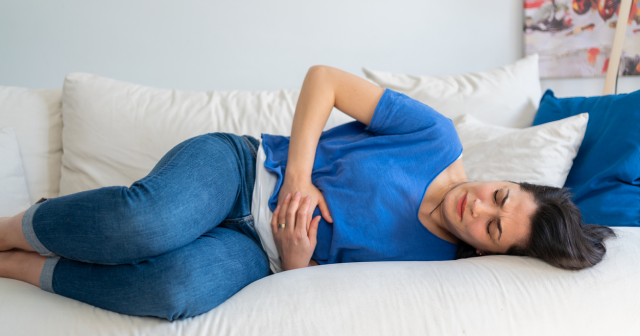Menopause – when you stop having periods – is a natural part of ageing and can cause lots of different symptoms.
Hair loss or thinning can be one of these symptoms, both in menopause and the time leading up to it (perimenopause). Read on to learn why this can happen, what treatments are available and when you should see a doctor.
Menopause and hair loss explained
There are many possible reasons for hair loss, and it’s often caused by a combination of things. As with many menopause symptoms, your hormones play a part. This is because the hormones oestrogen and progesterone are both involved in hair growth and health.
Causes of hair loss in menopause include:
- falling levels of oestrogen and progesterone – these hormones decline during the perimenopause and menopause, which can lead to your hair becoming thinner and growing more slowly
- female pattern hair loss – the most common cause of hair loss around the menopause. As well as being linked to those hormonal changes, it’s often passed on from your parents (hereditary). It causes hair follicles to shrink, leaving your hair very fine. Rather than bald patches, you’ll usually notice your hair getting thinner, mainly around the top and crown of your head
- age – it’s normal for hair to thin naturally as part of the ageing process
Hair loss can happen for other reasons, too, so check with your doctor that your hair loss is linked to menopause when you discuss treatment options.
Read about other possible causes of hair loss in women.

Treatment for menopause hair loss
If you’re getting hair loss or thinning, there are basic self-care measures that can help prevent further loss, including diet, haircare and styling changes. Read more about how to help your hair look its best.
There are also hair-loss treatments that can help deal specifically with hair loss related to menopause.
Minoxidil
Minoxidil is considered by doctors to be the most effective treatment for female pattern hair loss. Available from a pharmacy, it’s a hair-loss lotion or foam that you apply to the skin on your head (scalp). Here’s what you need to know.
1. The percentage of the active ingredient matters. The latest research shows that for best long-term results and lowest chance of side effects – such as itchy scalp or unwanted hair growth elsewhere on the body – a 2% Minoxidil solution is most suitable for female hair loss. There is some evidence to suggest that for Asian women, 1% can also be effective.
2. It’s a long-term treatment. It can take up to 4 months to see results. In a study of people who used it for 5 years, the most hair regrowth was seen after 1 year.
3. It only works for as long as you keep using it. Once you stop, hair loss comes back within 12 to 24 weeks. So it can be expensive.
4. It doesn’t work for everyone. Take pictures of your hair before you start using it and take them again every month or so for the first 4-6 months to see if you can notice a difference. This can help you decide if you want to keep using it.
Hormone replacement therapy (HRT)
Hormone replacement therapy (HRT) replaces the hormones your body lacks during the menopause and can help with many menopause symptoms.
Because it increases your levels of oestrogen, it can help your hair’s growth cycle to go back to normal. For some people, HRT slows down or stops hair loss. But again, it doesn’t work for everyone.
HRT comes in tablets, skin patches, implants or a gel that can be rubbed into your skin. It’s a good idea to speak to your doctor about the possible benefits and risks of HRT for you.
Other hair-loss treatments
Depending on the cause of your hair loss, there are other self-care measures and treatments that may help, from shampoos to medical procedures. Read more about hair loss treatment for women.
Outlook: is menopausal hair loss permanent?
Hair loss can be upsetting, particularly when you’re also dealing with other changes that can happen during the menopause. Whether it will grow back depends on what's causing your hair loss. The stress of menopause can cause an increase in hair loss, and this will grow back once the stress has passed. But hormonal changes can cause more permanent hair loss. So as soon as you notice it at levels that cause you concern, talk to your doctor to work out the best approach for you.
When to see a doctor
It’s a good idea to speak to a doctor as soon as you notice any hair loss or thinning, so they can check what’s causing it. Many underlying causes can be easily treated, and you may find that your hair loss isn’t a side effect of the menopause.
Your doctor will ask about any stress you might be under, other symptoms or health conditions, your diet and other aspects of your lifestyle. They may want to do a blood test to check your hormone levels and thyroid, as well as levels of iron and other vitamins.
There are also a few warning signs with hair loss that mean you should see a doctor as soon as possible.
Your health questions answered
How common is menopause hair loss?
“Hair loss is common around the time of the menopause. Although it isn’t known exactly how many people are affected, it's thought that about 40% of women will experience hair loss after the menopause.”
Do you get hair loss on your body as well?
“Menopause hair loss generally happens on your head. Some types of hair loss can be caused by a hormone imbalance, where your body has too much of the hormones responsible for male characteristics (androgens). When oestrogen falls during the menopause, it can mean you have relatively more androgen. This might cause hair loss on your head and hair growth in other places, such as on your face.”







